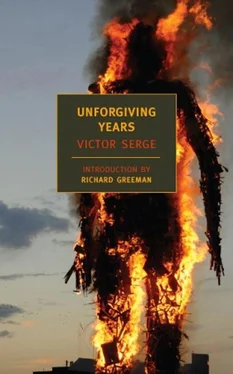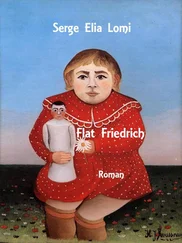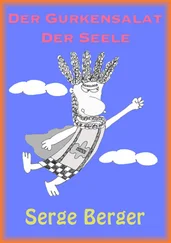And Sacha opened his eyes as he did every day of his life, those preoccupied eyes, wise, real, and infuriating.
“What’s the matter, Nadine?”
“Oh, nothing, I thought I heard…”
“It’s a motorcycle. What a lout, making a racket at this hour! Lie down. Go back to sleep.”
He exasperated her. The exasperation melted into tenderness.
“I love you,” she said in a childish voice. “I love life, I love death, it’s strange…”
His voice echoed hers: “Strange.”
* * *
Monsieur Gobfin, assumed by unobservant clients to be the hotel desk clerk, actually performed much more important tasks. The trust of a proprietor ill with a kidney problem invested him with quasi-managerial status; and if he spent the busiest hours of both day and night behind the little reception counter, distributing the mail, hooking and unhooking the room keys, it was mostly due to his love of the job. An eye on everything! Seven minutes’ walk from place d’Anvers, six minutes from the confluence of the rue de Clignancourt and the boulevard de Rochechouart, this hotel was like Lutetia itself, a kind of vessel anchored in the middle of treacherously troubled waters. Fail to count the linen returned by the laundry two days in a row, and you will soon count the cost of your oversight. Neglect to appear in the kitchen two hours before the first sitting for luncheon — and talk about pilferage, my rascals! A reasonable level of theft, let’s say around ten percent is par for the course because in this world, or at least here in Paris, everybody’s got to eat; but the house has to make a profit too, eh? And Monsieur Gobfin would never stand for “being taken for a fool, what with the price of Normandy butter.” “I’m nobody’s sucker,” he’d say, and people took his word for it.
Monsieur Gobfin’s long sparse hair, glued in black strips with brilliantine over his yellowed scalp, along with his hollow cheeks, conveyed such a knowing, indulgent sagacity that his eyes hardly ever strayed below the relatively higher zones. The brown, skittish gaze that never rested, shying away as soon as it encountered another’s, shot out simultaneously in several directions, scrutinizing the clients from bottom, sides, and angles, homing in on the glints of soul that show through in the back of a man’s hand, the cut of a coat, the timbre of a cough, the manner in which a pen is gripped or a bill examined. A glint of soul, needless to say, is an excessively literary flourish in this context, foreign to Monsieur Gobfin’s vocabulary. He would rather have said, “how shall I put it, something like an odor, at times even a bit of a stench.” His perusal was apt to begin at the level of the gut, for the belly is infinitely expressive: a pederast’s paunch can never be confused with that of a public works engineer who goes for the tarts in the Lune-Qui-Rit bar. The rotundity of the con man is quite unlike, say what they will, that of the stockbroker, who is equally devious but for whom the letter of the law is sacred. The fabric of which garments are made, their quality, their color, their buttons, their wear, tear and care — all are of a revealing eloquence. It is impossible for a sea captain, when in civilian dress, to wear the same three-piece suit in the same way as a fashionable type who specializes in trafficking female slaves — white, black, or other. Their hands, exposed below sleeves or cuffs, the hair on male hands, the bumps and furrows of the joints, the rings on the fingers, say more about someone than identity documents, which are, at least one in ten, expressly designed to say nothing… Monsieur Gobfin was unaware of being a profound psychologist, but practically speaking that’s what he was, to the unappreciated extent that it is possible to be one without leaving that vast circle bound by sordidness, cunning, stupidity, and police intrigues. His attention was trained on couples, vices, crimes, expenditures. He could instantly sniff out the legitimate couples, “mousey-spouseys” to him, and these were intriguing only if they hinted at some louche flaw, rare perversion, drama of the wallet or the groin, all of which were easily detected. Illicit couples, for the most part, offered little of interest. (The hotel was too respectable to let rooms by the hour, with some exceptions; but for the night, one couple’s money is as good as another’s and the gentleman who checks in with a prostitute generally doesn’t look too closely at the little extras on the bill…) But hidden crime, now, crime that ripens all by itself behind an innocently harmless exterior, festering beyond the reach of newspapers, prosecutors, and scandal — there lies the common yet rare substance of human relationships worth studying silently from an observation post like his. Of course, the crasser breed of criminal needs to be screened out in short order, to avoid bad publicity. Guided by intuition alone, one night when business was slow and half the rooms were free, Monsieur Gobfin put on his most ingratiating voice to lament, to the giggly young lady in the expensive straw hat and her small-boned gentleman friend with hair dyed the color of flax, that there was nothing available, and sent them to the competition: “You’ll find it very comfortable there, Madame, Monsieur. They’re even a bit more modern than we are!” (Two days later he learned in Le Petit Parisien of the sudden and suspicious demise of this industrialist from the Rhône, whose mistress was being sought by the prosecutor’s office… It was one of the supreme satisfactions of his life.) He likewise saw off the obese individual bursting with commercial probity — a respected notary, solicitor, company director? — who turned up with a transvestite playing the part of the young mistress to perfection; the competition found itself the scene of an uproarious farce, kept quiet by a hefty sum of hush money. Monsieur Gobfin was only half gratified by this outcome; he took pride in his perspicacity, but missing out on a hefty sum because of it is galling, you have to admit.
Police Inspector Barougeot regularly dropped by around nine a.m., glanced over the registration forms of the foreign guests, scribbled down a name or two for the sake of appearances, and repaired to the dining room in the company of Monsieur Gobfin, where the two of them sat over hot black coffee washed down with a shot of vintage marc. At that hour of the morning, the restaurant was bathed in pleasant white light. Two Englishmen were wolfing down their ham and eggs; an old lady was munching croissants, with a romantic novel by Gabriele d’Annunzio propped open before her. Inspector Barougeot showed Monsieur Gobfin a batch of photographs being circulated by the information and investigation services (as well as a few private agencies). Monsieur Gobfin put two of them aside, not seeming particularly curious about either. “The reward is two thousand francs,” the inspector said. “Skinflint millionaires…” he sighed.
Monsieur Gobfin concealed his nervousness, which turned him yellower. By twenty past one, the need to talk had grown so pressing that he went up to the dining room. Madame Noémi Battisti had just left the table and returned to room 17. Bruno Battisti was reading foreign newspapers and nibbling on raisins and nuts. At the other end of the room, the Negro sitting alone at a table had started his lunch. There were some other, insignificant people, like the man and woman who had business interests in Dijon, and their pale daughter, sapped by solitary vice. With no apparent hesitation, for his hesitation was inner, Monsieur Gobfin toured the tables making a slight bow beside each one, like a head-waiter.
“Monsieur Battisti, isn’t it?” he said. “We trust you find the service to your satisfaction. Today is our day for Burgundian cuisine…”
Читать дальше












